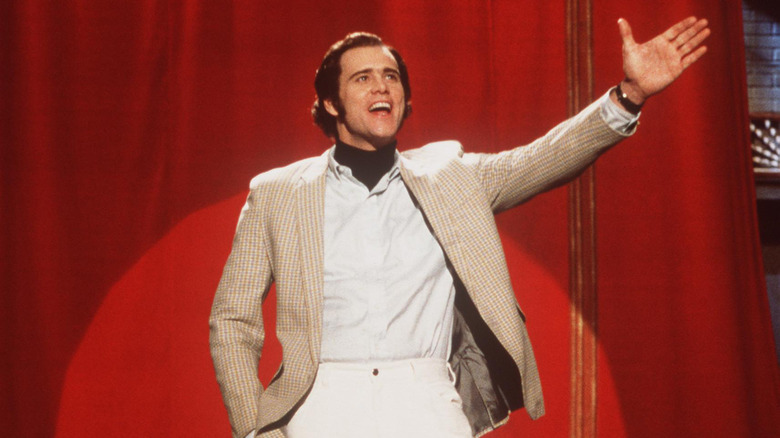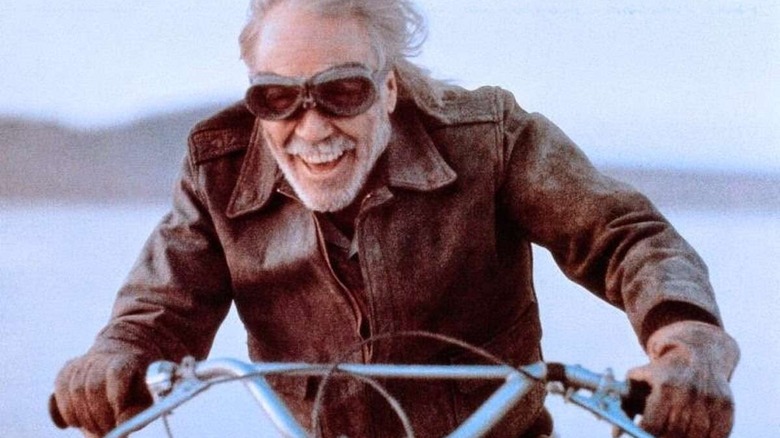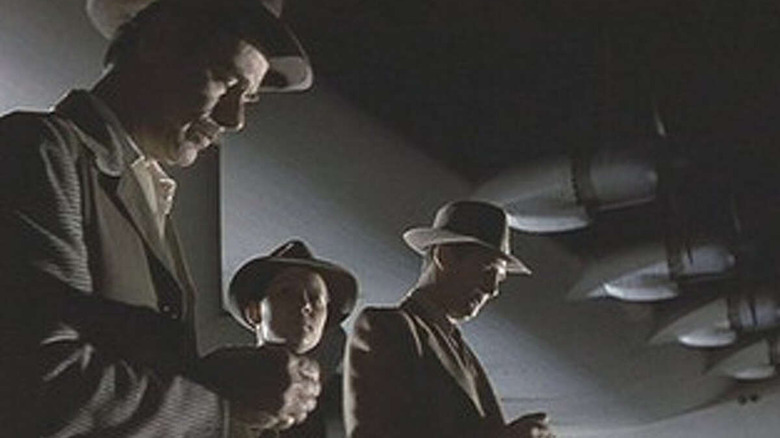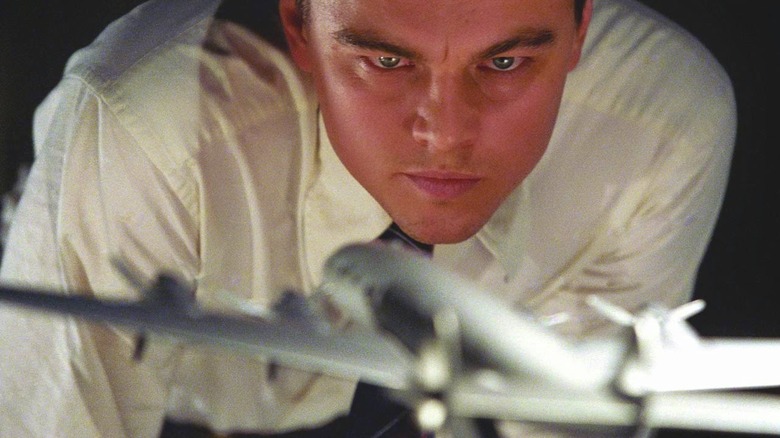Christopher Nolan And Jim Carrey Almost Made A Howard Hughes Biopic Together
Howard Hughes has had a long and fascinating relationship with Hollywood. He directed two feature films ("Hell's Angels" in 1930 and "The Outlaw" in 1943), and produced over 25 besides (usually going uncredited). Hughes' company owned a major stake in the RKO film and media studio, and eventually became the sole owner of RKO's film division following the landmark United States v. Paramount Pictures, Inc. antitrust lawsuit that prevented vertical integration in entertainment. Hughes eventually changed focus from entertainment to real estate, as well as the air and space industries, but showbiz was always close to his heart. Thanks to a severe case of obsessive-compulsive disorder, as well as severe bouts of paranoia, Hughes would spend extended periods cloistered in the top floor of his properties watching "Ice Station Zebra" over and over again, injecting himself with any number of drugs, hiding from the public, and saving his own excretions in jars. Hughes died in 1976 at the age of 70. He died on a plane in flight.
Making movies about Howard Hughes — either explicitly, or using him as a character template — began as early as at least the 1960s, and still happens from time to time (Howard Stark, Iron Man's father, was clearly modeled on Hughes). The George Peppard character in the 1964 film "The Carpetbaggers" was modeled on Hughes, as was the Texan billionaire played by Jimmy Dean in the 1971 James Bond flick "Diamonds are Forever." After Hughes' death, actors began depicting him directly. Tommy Lee Jones played Hughes in a 1977 TV biopic. Jason Robarts played Hughes in Jonathan Demme's "Melvin and Howard" in 1980. In Francis Ford Coppola's 1988 film "Tucker: A Man and His Dream," Hughes was played by Dean Stockwell. Terry O'Quinn played Hughes in 1990's "The Rocketeer."
Most notably, Leonard DiCaprio played Hughes in Martin Scorsese's expansive biopic "The Aviator," which followed Hughes from his rise through film, his expansion into aerial engineering, always careful to show how his OCD kept his life a constant struggle. In "The Aviator," Hughes is not seen as wholly heroic, wholly sympathetic, or wholly wicked. He was a man with obsessions and illnesses. "The Aviator" was nominated for 11 Academy Awards, including Best Picture. It won five, including Best Supporting Actress.
And while Scorsese's version was impressive, it was the version audiences received instead of a rendition that was once assembled by Christopher Nolan, and was planned to star Jim Carrey as Hughes.
'I think it's the best script I've ever written'
While on the press tour for his 2014 film "Interstellar," Christopher Nolan revealed some details to The Daily Beast about the Howard Hughes biopic he was interested in making, and how disappointed he was when Scorsese essentially beat him to the punch:
"I was definitely like, 'F***!' I think it's the best script I've ever written, and I had a really wonderful experience writing it. Yeah, it was a frustrating experience that the other movie got going. Will I revisit it? I have no idea. I really don't think about what I'm going to do next until I'm completely finished, and for the next couple of weeks I'm still all about 'Interstellar.' I wouldn't necessarily rule it out, but I wrote it a long time ago."
Nolan was pretty thrilled with his Hughes biopic, especially once Jim Carrey was attached to star. Carrey had made a splash in 1999 playing Andy Kaufman for Miloš Forman's "Man on the Moon," and had proven himself to the Hollywood firmament that he was ready to be taken seriously as an awards-ready actor. In a 2002 interview with The AV Club, Nolan had first revealed his enthusiasm for Carrey, and that he was eager to be the first to get an ostensibly cursed Howard Hughes biopic off the ground:
"Well, it's not cursed. It's just never happened. Cursed is when you do it and it fails miserably, and somebody else does it and it fails miserably. No one has ever gone ahead with a Howard Hughes biopic. I don't know why it has a reputation as being cursed, and I don't intend to find out. I think casting may have had something to do with it, and I think I've found the one guy, in the person of Jim Carrey, who can actually do what's required by the part. It's a monumental part to try to pull off, no question. But that doesn't mean it can't be done. I hope.
The American concern with material wealth
Nolan also talked to the website Showbizmonkeys about the Howard Hughes project, and was more descriptively effusive about Carrey's talents and how much his leading actor was collaborating with him on the movie:
Oh, quite a lot. Just in terms of my imagination of knowing who is going to play the part. It is different sitting down to write, and sitting down to write already knowing who is going to play the part. We have met several times to discuss the specifics of the direction we were going in and Jim has some fantastic ideas which are close to my ideas. We are having quite a bit of fun.
Nolan was also impressed with Carrey's ability to portray Andy Kaufman as well as he did, and knew he was perfect:
He is just perfect. He was born to play him. He just really is. This film has been discussed to be made for years in various forms but never has. The casting is one of the things behind that. When you have that and you hear Jim's take on the characterization and you look at his extraordinary gift for channeling individuals like in his portrayal of Andy Kaufman, you can see that Jim Carrey is a very unique talent. What I need is an individual who can play all the unique aspects of the character of Howard Hughes.
And why make a biography of Howard Hughes? It should be obvious.
Howard Hughes is just an astounding figure. Most people know a little bit about his life but not that much which makes him an ideal subject for a film. He embodies so much of the American concern with material wealth and the effect that it may have on you. And how do you deal with extraordinary success and fame. He is an extraordinary individual from that point of view. He has the extremes in which he lived. He was on top of the world and the first real American billionaire and then he spent decades shut away in small hotels. He is just fascinating.
The many Howard Hughes biopics
It was Scorsese who would end up making the high-profile Howard Hughes biopic, and even the road to get there was circuitous. Curiosity about Hughes always ran high, and when Hughes became more and more reclusive, more and more people wanted the skinny. In the early 1970s, a novelist named Clifford Irving claimed to have been in direct contact with Hughes, and the two of them were ostensibly writing an autobiography together. It turns out Irving was faking the interviews, and Hughes eventually had to come out of hiding to point out that Irving's writings were fictional. The 2006 Lasse Hallström film "The Hoax" was about Irving.
Edward Norton once expressed interest in making a Hughes biopic, as did Warren Beatty (who eventually did play Hughes in his film "Rules Don't Apply" in 2016). Eventually, Castle Rock Entertainment optioned the rights to a Howard Hughes biopic with Michael Mann attached to direct, with Leonardo DiCaprio set to star. This was in 2002, when Nolan and Carrey were already working on their version. Entertainment Weekly pointed out the production race between the two. Mann eventually left that production, and Scorsese became the director, working with DiCaprio, to complete the film. Nolan put his Hughes project aside when he saw Scorsese was already working on his.
Nolan need not have abandoned his film, as similar/competing films are released in close proximity often. The Truman Capote biopic "Capote" was released only 13 months ahead of the other Truman Capote biopic "Infamous." Stephen Frears' "Dangerous Liaisons," based on the stage play "Les Liaisons Dangereuses" was released a mere year before Miloš Forman's "Valmont" based on the original novel "Les Liaisons Dangereuses." Perhaps room could have been made for two Hughes biopics after all.



